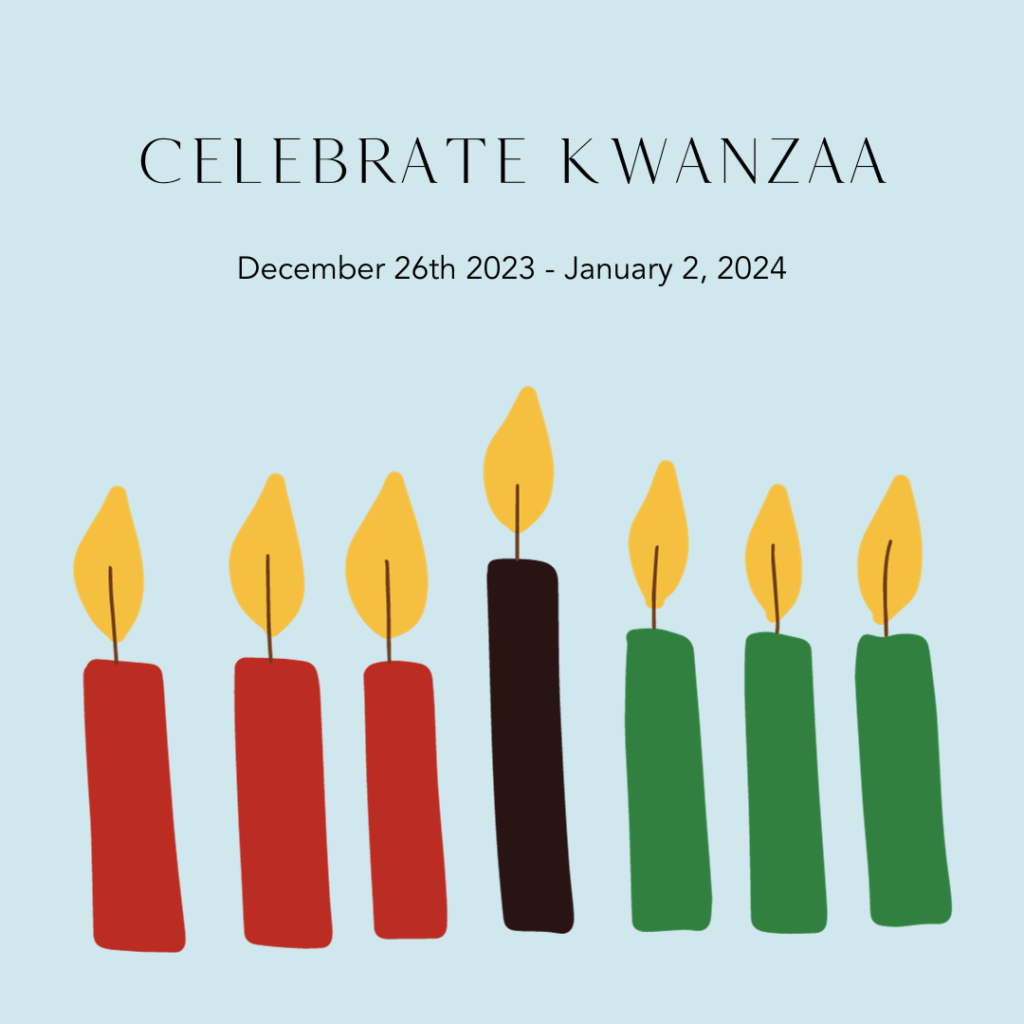Just like other American holidays, Kwanzaa is steeped in culture and tradition. It is a wonderful, week-long celebration starting on December 26th, 2023. However, unlike other American holidays, what makes Kwanza so special is that Kwanzaa is an observance rooted in African heritage.
Kwanzaa was started in 1966 by Dr. Maulana Karenga. Originally from Maryland, and now 82 years of age, Dr. Karenga is a professor and activist. He created Kwanzaa as a way to bring African American communities together and reaffirm their cultural identity, during a devastating and violent period in American history. The Civil Rights Movement was underway, and this was also part of the efforts to combat the systemic racism running through the country.
Kwanzaa promotes unity, self-determination, responsibility, purpose, creativity, and faith. It is a holiday which emphasizes the importance of family, community, and cultural pride. The holiday is based on seven specific principals, each dedicated to one day.
The Seven Principles (Nguzo Saba)
- Umoja (Unity): To strive for and maintain unity in the family, community, nation, and race.
- Kujichagulia (Self-Determination): To define, name, create and speak for ourselves.
- Ujima (Collective Work and Responsibility): To build and maintain a community together and make our brother’s and sister’s problems our problems and to solve them together.
- Ujamaa (Cooperative Economics): To build and maintain our own stores, shops, and other businesses and to profit from them together.
- Nia (Purpose): To make our collective vocation the building and developing of our community in order to restore our people to their traditional greatness.
- Kuumba (Creativity): To do always as much as we can, in the way we can, in order to leave our community more beautiful and beneficial than we inherited it.
- Imani (Faith): To believe with all our heart in our people, our parents, our teachers, our leaders, and the righteousness and victory of our struggle.
Celebrating Kwanzaa
Kwanzaa is celebrated with various rituals and traditions. The most recognizable symbol is the Kinara, a candleholder with seven candles – three red, three green, and one black, representing each of the Seven Principles, and they are lit in a specific order each night.
Children and Kwanzaa
Bringing children into the celebration of Kwanzaa can be a rewarding and educational experience, fostering a sense of cultural identity, community, and an understanding of important values. Here are some ways to involve children in the holiday of Kwanzaa:
Storytelling
- Share stories about the principles of Kwanzaa with children. Use age-appropriate books, folktales, or personal stories to explain each principle and its significance.
- Emphasize the values of unity, responsibility, creativity, and other principles in a way that is engaging and relatable to children.
Crafts and Activities
- Engage children in Kwanzaa-themed crafts and activities. For example, they can create their own Kinara using simple materials, make colorful decorations, or craft symbols associated with each principle.
- Encourage creativity by having them design their own Kwanzaa banners or flags that represent the values of the celebration.
Candle Lighting Ceremony
- Involve children in the nightly candle lighting ceremony. Allow them to take turns lighting the candles (with supervision, of course) and explain the significance of each principle in simple terms.
- Use storytelling or interactive discussions during the ceremony to help children understand the principles and how they relate to their lives.
Cooking and Food
- Explore traditional African and African American recipes together. Cooking and sharing a meal can be a meaningful way to connect with cultural heritage.
- Discuss the importance of cooperative economics by involving children in the planning and preparation of a special Kwanzaa feast.
Music and Dance
- Introduce children to traditional African music and dance. Play music from different regions of the African continent and encourage children to dance or create their own rhythmic patterns.
- Consider attending or organizing community events that include music and dance performances related to African culture.
Community Involvement
- Participate in community events or Kwanzaa celebrations that involve children. Many communities organize family-friendly activities, performances, and workshops during the holiday season.
- Volunteer together as a family to emphasize the principle of collective work and responsibility.
Gift-Giving with a Purpose
- Emphasize the principle of Kuumba (Creativity) by encouraging children to make handmade gifts for family and friends. This reinforces the idea of thoughtful and creative gift-giving.
- Discuss the concept of Ujamaa (Cooperative Economics) by involving children in the process of selecting or making gifts that support local artisans or businesses.
Reflection and Gratitude
- Foster a sense of gratitude and reflection. Encourage children to reflect on the positive aspects of their lives, express gratitude, and set simple goals for the coming year based on the principles of Kwanzaa.
Kwanzaa embodies an incredible celebration, woven within the tapestry of African American culture. Kwanzaa is a reminder of the African American community’s fortitude and resilience, emphasizing the importance of safeguarding and transmitting cultural heritage. As individuals worldwide come together to honor Kwanzaa, it stands as a testament to the enduring strength derived from unity, purpose, and the diverse traditions that weave together the rich fabric of our African American community.
